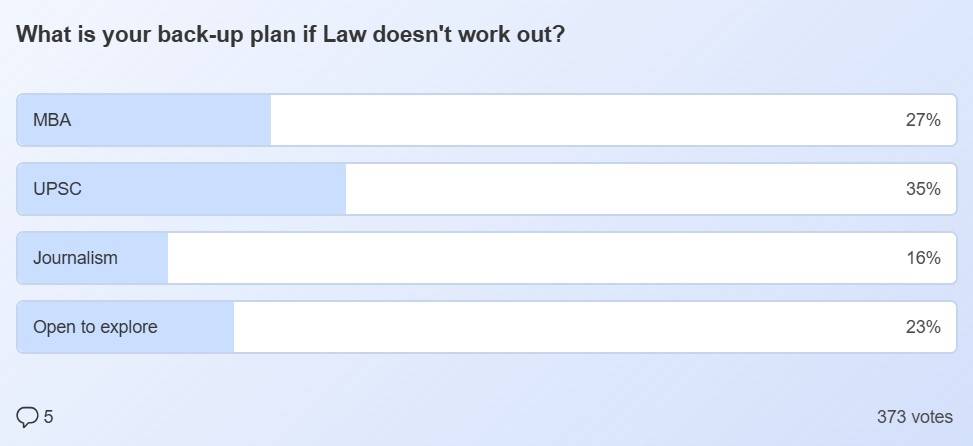Shiksha Poll Reveals Law Aspirants’ Back-Up Career Choices in 2025 – UPSC, MBA & Beyond
A career in Law is a dream for many students who prepare dedicatedly for years and have a strong knowledge of the justice system. It's a highly competitive field, though. It's not easy to have a successful legal career.
The good thing is that many students shift their interests and future goals in between, discovering a new passion along the way.
To understand what Law aspirants consider as their "Plan B", Shiksha recently conducted a poll survey, asking Law aspirants about their backup plans if Law does not work out. The results revealed that they are keeping diverse and ambitious options open. Continue reading the article where we provide the full analysis of the poll.
UPSC – The Most Popular Alternative
Out of 100% votes, 35% Law aspirants opted for the UPSC exams option if their Law career goals do not work out. The percentage of votes going to the UPSC option was not surprising since the Law students have a strong base in subjects like governance, constitution, political science, etc., essential for UPSC preparation.
The full form of UPSC is Union Public Service Commission, a central recruiting agency run by the Government of India. It conducts several exams and interviews to shortlist and appoint candidates for various positions. The most popular exam conducted by the UPSC is the CSE (Civil Services Examination), used to recruit candidates for positions such as the Indian Administrative Service or IAS, Indian Police Service (IPS), and Indian Foreign Service (IFS).
Why UPSC may appeal to Law students
Find some reasons why UPSC exams are great for Law students:
- It uses their knowledge of the Indian Constitution and legal frameworks.
- It offers a stable, respected, and impactful career in public service.
- It widens their career scope beyond legal practice to policy-making and governance roles.
MBA – A Close Second
MBA programs were the second-most popular choice among Law aspirants, with 27% votes out of 100% as a backup plan. An MBA is a PG-degree program that offers skills and knowledge in business management and leadership. As there are many specializations, this can open doors to leadership roles in corporate, consulting, finance, and entrepreneurship.
Why an MBA may appeal to Law students
Find the important reasons why MBA courses can be great for students studying Law.
- It improves career more than areas in law.
- It helps build skills in management, finance, and more.
Journalism – The Last Option
The lowest percentage of votes was received by the Journalism option. It had only 16% of Law aspirants who considered Journalism as their backup plan. As a subset of mass communication and media field, this field requires professionals to find out, create, evaluate, and present facts as news pieces. Law students are good in research, fact-checking, and presenting arguments. Sub disciplines like investigative journalism, legal reporting, and policy analysis are common.
Why Journalism may appeal to Law students
Few reasons why Journalism courses can be great for Law students:
- It can influence public opinion and inform society.
- It has the scope for investigative work and storytelling.
- Students can get roles in print, television, and digital media with legal expertise as a niche.
Open to Explore – Keeping Options Flexible (23%)
The rest of the 23% of students chose the "open to explore" option. For them learning a new skill or switching careers in tech, design, or PR are some choices.
Why the “open to explore” option may appeal to Law students
Some reasons why many Law students are finding newer choices:
- It helps them choose a field where the job market shifts.
- They can explore related fields with law.
Final Thoughts
The poll run by Shiksha paints a clear picture of what Law aspirants think. They are ambitious, adaptable, and opt for roles that need communication, leadership, and critical thinking skills. While the topmost choice among Law aspirants has been UPSC, their second preferred option is MBA, the third is open to explore, and meanwhile, the last option is Journalism.

 Call 8585951111
Call 8585951111
Akansha Bisht is an education content specialist with over 1 year of experience in student guidance and academic writing. At Shiksha.com, she is focused on helping students get the right courses by simplifying the d
Read Full Bio